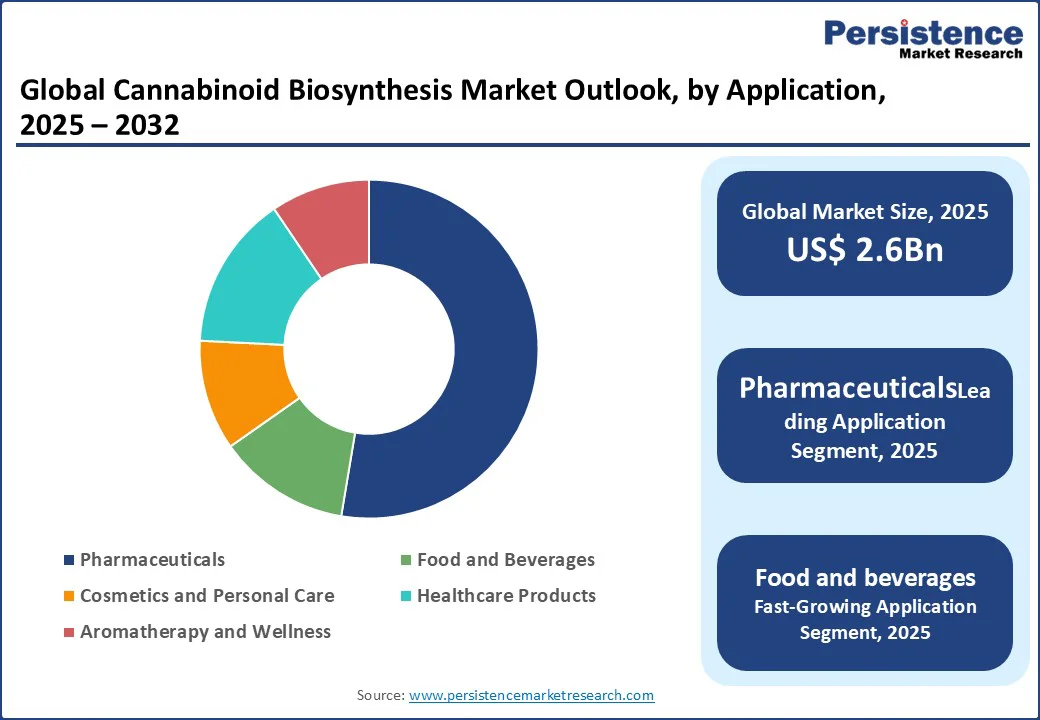ID: PMRREP32885| 191 Pages | 15 Sep 2025 | Format: PDF, Excel, PPT* | Healthcare

The global cannabinoid biosynthesis market size is likely to grow from US$2.6 Bn in 2025 to US$6.6 Bn by 2032, registering a CAGR of 14.2% during the forecast period from 2025 to 2032.
Key Industry Highlights:

| Global Market Attribute | Key Insights |
|---|---|
| Cannabinoid Biosynthesis Market Size (2025E) | US$2.6 Bn |
| Market Value Forecast (2032F) | US$6.6 Bn |
| Projected Growth (CAGR 2025 to 2032) | 14.2% |
| Historical Market Growth (CAGR 2019 to 2024) | 13.6% |
The cannabinoid biosynthesis market has experienced steady growth, driven by increasing demand for sustainable production methods, advancements in biotechnology and synthetic biology, and rising consumer preference for high-purity, consistent cannabinoid products as alternatives to traditional plant extraction with reduced environmental impact.
The global increase in sustainable cannabinoid production and consumption is driving growth in the cannabinoid biosynthesis market. Rising demand for eco-friendly alternatives to traditional cultivation, supported by environmental awareness and evolving consumer preferences, is creating opportunities for bio-engineered and scalable products.
Cannabinoids produced through microbial fermentation and yeast-based platforms, such as those using engineered organisms to synthesize CBD and THC, are widely used to enhance sustainability, improve purity levels, and reduce water and land usage, ensuring lower environmental impact.
With growing interest in green and clean-label wellness solutions, biosynthesized cannabinoids provide precise, contaminant-free options for medical and consumer improvement, supporting sustained market expansion across both developed and emerging regions. Their adoption in pharmaceuticals is particularly important where consistency is critical.
Additionally, global legalization efforts, with dozens of countries permitting medical cannabis in recent years, have amplified demand, as biosynthesis allows for cost-effective scaling without agricultural risks such as weather variability or pesticide contamination.
Statistics from the World Health Organization indicate that sustainable biotech approaches could significantly cut carbon emissions in cannabinoid production, further justifying investments from major players. This driver is bolstered by R&D advancements, such as CRISPR gene editing in host organisms, which have notably reduced production times in recent trials, enabling faster market entry and broader application in therapeutics for conditions such as epilepsy and chronic pain.
The cannabinoid biosynthesis market faces substantial restraints that limit its pace of growth and scalability. One of the foremost challenges is the elevated cost of establishing biotechnology infrastructure and developing engineered microbial strains, which often requires multimillion-dollar R&D investments. Such high entry costs make it difficult for startups and smaller enterprises to participate, concentrating opportunities among well-capitalized players.
In addition, the regulatory landscape is complex and restrictive, with agencies such as the FDA and EMA imposing rigorous approval processes that can take several years to complete, delaying commercialization and adding heavy compliance expenses.
Intellectual property disputes surrounding biosynthesis patents further complicate the cannabinoid biosynthesis market, creating legal uncertainty and discouraging partnerships or new entrants. Alongside these structural barriers, public skepticism toward synthetic biology and cultural resistance in regions with stricter cannabis policies present hurdles for consumer and regulatory acceptance. Collectively, these challenges hinder innovation, slow the scale-up of production, and restrict the widespread adoption of biosynthesized cannabinoids across global markets.
Emerging innovations in biosynthesis technologies present a significant opportunity for the expansion of the cannabinoid biosynthesis market. By leveraging advanced metabolic engineering, manufacturers can now produce rare cannabinoids such as cannabigerol (CBG) and cannabinol (CBN), which are typically available only in trace amounts through plant extraction.
These compounds are gaining strong interest for their promising anti-inflammatory, neuroprotective, and therapeutic potential, opening pathways to premium pharmaceutical applications. Beyond traditional healthcare, the ability to design cannabinoids with enhanced bioavailability and targeted therapeutic effects creates opportunities in fast-growing niches such as pet wellness, sports nutrition, and functional food supplements.
Strategic collaborations between biotech innovators and global pharmaceutical companies are expected to accelerate commercialization, streamline regulatory pathways, and expand clinical research efforts. In addition, rising government support for sustainable biotechnology through grants and funding programs is helping reduce production costs and improve scalability. Together, these factors position biosynthesized cannabinoids as a transformative opportunity, driving innovation, diversification, and market growth worldwide.
The cannabinoid biosynthesis market is segmented into phytocannabinoids, synthetic cannabinoids, endocannabinoid system, modulators, and cannabinoids. Phytocannabinoids dominate, holding approximately 60% market share in 2025, due to their critical role in providing renewable, bio-identical options for applications in pharmaceuticals. Advanced formulations from Demetrix are widely adopted for their reliability and efficiency in sustainable manufacturing.
Synthetic cannabinoids are the fastest-growing segment, driven by increasing demand for cannabinoids that enhance purity and versatility in tailored materials. Innovations in high-efficiency variants from Ginkgo Bioworks improve product quality, boosting adoption in industrial and premium applications, particularly in cosmetics and wellness.
The cannabinoid biosynthesis market is divided into cannabis sativa, cannabis indica, hemp-derived cannabinoids, and others. Hemp-derived cannabinoids lead with a 45% share in 2025, driven by high global demand for basic biosynthesis sources, with millions of units produced annually for their sustainability and versatility in pharmaceutical and food applications.
Cannabis sativa is the fastest-growing segment, fueled by rising demand for advanced and customized offerings in manufacturing. The success of functional sources in creating high-quality, specialty products drives adoption in healthcare and aromatherapy across diverse markets.
The cannabinoid biosynthesis market is segmented into pharmaceuticals, food and beverages, cosmetics and personal care, healthcare products, and aromatherapy and wellness. Pharmaceuticals dominate, holding approximately 50% market share in 2025, due to their critical role in sustainable production, consistency, and extended therapeutic efficacy. Formulations from Jazz Pharmaceuticals PLC are widely adopted for their reliability in commercial applications.
Food and beverages are the fastest-growing segment, driven by demand for cannabinoids that enhance eco-friendliness and performance in specialty products. Innovations from Canopy Growth Corp improve quality, boosting adoption in green and premium applications, particularly in wellness and consumer goods.

North America dominates the global market, expected to account for 41% market share in 2025, driven by advanced biotechnology infrastructure, high consumer demand for sustainable cannabinoids, and strong adoption of innovative biosynthesis solutions.
The demand for phytocannabinoids is surging, fueled by the popularity of eco-friendly, consistent products in retail and industrial sectors. Leading brands such as Demetrix and Ginkgo Bioworks are introducing biotechnology-integrated platforms tailored to enhance purity and sustainability.
The U.S. market trends are particularly noteworthy, with federal legalization progress and state-level initiatives accelerating growth. In the U.S., the cannabinoid biosynthesis market is propelled by robust R&D funding, with significant investments directed toward biotech startups focusing on yeast-based cannabinoid production.
Trends include the rise of medical-grade biosynthesized CBD for epilepsy treatments, as seen in FDA-approved products, and consumer shifts toward THC-free wellness items. Companies such as Amyris Inc are leveraging partnerships with pharmaceutical firms to expand in states such as California and Colorado, where recreational markets drive innovation in scalable production.
Europe is dominated by Germany, the U.K., and France, benefiting from strong regulatory support and rising demand for sustainable products. Germany leads with a substantial market share, where players such as Evolva Holding SA and Willow Biosciences Inc address demand for synthetic cannabinoids in large-scale industrial applications. The EU’s environmental regulations and sustainability initiatives encourage eco-label biosynthesis solutions, strengthening innovation and consumer trust.
In the U.K., market expansion is driven by functional cannabinoid formulations, with Hyasynth Biologicals introducing advanced solutions for premium and green manufacturers. France shows strong growth in healthcare applications, with CB Therapeutics providing specialized offerings for professional industries. Supportive policies promoting biotech materials enhance regional opportunities, creating a diverse and competitive landscape for long-term growth.
Asia Pacific is the fastest-growing region, led by China, India, and Japan. In China, the rapid expansion of biotech manufacturing, coupled with the rising middle-class population’s preference for wellness goods, boosts demand for advanced cannabinoid formulations. Companies such as Zymergen Inc customize offerings for local requirements, strengthening adoption in commercial segments.
India’s market is driven by consumer preference for green products and government initiatives such as the Biotechnology Industry Research Assistance Council, which promotes bio-processing modernization. Domestic players such as Renew Biopharma offer cost-effective, high-performance solutions.
In Japan, high-tech and functional cannabinoid applications cater to premium production, with InMed Pharmaceuticals gaining traction. The growth of e-commerce platforms enhances product accessibility, supporting sustained market expansion.

The global cannabinoid biosynthesis market is highly competitive, with global and regional players competing on innovation, affordability, and compliance with regulatory standards. The rise of bio-engineered and functional cannabinoids intensifies competition, as companies meet stringent quality requirements and consumer demands for sustainable products. Strategic partnerships, acquisitions, and technological advancements are key differentiators.
The cannabinoid biosynthesis market is projected to reach US$2.6 Bn in 2025.
Rising demand for sustainable production methods, advancements in biotechnology, and government legalization initiatives are key drivers.
The cannabinoid biosynthesis market is poised to witness a CAGR of 14.2% from 2025 to 2032.
Innovation in eco-friendly and functional cannabinoids presents significant growth opportunities.
Demetrix, Ginkgo Bioworks, and Hyasynth Biologicals are among the key market players.
| Report Attribute | Details |
|---|---|
| Historical Data/Actuals | 2019 2024 |
| Forecast Period | 2025 2032 |
| Market Analysis | Value: US$ Bn, Volume: As Applicable |
| Geographical Coverage |
|
| Segmental Coverage |
|
| Competitive Analysis |
|
| Report Highlights |
|
By Product Type
By Source
By Application
By Region
Delivery Timelines
For more information on this report and its delivery timelines please get in touch with our sales team.
About Author